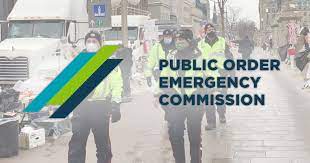Testimony before the Public Order Emergency Commission reveals the case for government invoking the Emergencies Act is either weak or very weak. The Prime Minister was, in fact, opposed to members of his cabinet or senior public health officials meeting with protest leaders to discuss the scientific basis for the mandates. Protest leaders hoped that by traveling to Ottawa they could air their views with those responsible. But before they arrived, Trudeau labeled them as a “fringe minority” with unacceptable views.
On February 13, the federal cabinet knew that on the day before the City of Ottawa had already reached an agreement with the protesters to de-escalate the conflict by removing most of the trucks from the streets. By noon on February 14, 102 protest vehicles, including 42 trucks, had been removed from the city streets. Wellington Street, designated as a Parliamentary Precinct Street, had trucks remaining. The city had agreed that this was acceptable, because the protest was against the federal government and not against the city.
The same day, cabinet was given a “Proposal: Trucker Protest Engagement” from the Deputy Minister of Public Safety, Rob Stewart. The cabinet learned that this proposal was supported by Ontario Provincial Police Insp. Marcel Beaudin with the assurance that Police Liaison Teams were ready to make contact and negotiate with the protesters to defuse tension.
Testimony of OPP intelligence chief, Supt. Pat Morris, revealed that there was no intelligence information suggesting that the nation’s sovereignty was under threat. At that time, Morris was the key person the cabinet was receiving intelligence updates from. As learned later, he was astonished by allegations of “extremist violence” since nothing Morris had seen supported that conclusion.
Despite political figures allegations to the contrary:
- No convoy protester was responsible for arson in Ottawa
- No protesters in Ottawa had been charged with a firearms offense.
- No protester was involved in money laundering or terrorism
- The protest was ruled to be legal by an Ontario court (February 7)
- Over 88 percent of crowdfunding came in mostly small donations from Canadians
- There was both ethnic and gender diversity among the protesters.
Still, the Prime Minister chose to invoke the Emergencies Act on Valentines’ Day 2022. A card of love to the protesters.
Now we know that the commission testimony shows the government was determined to build a case against the protesters. In fact, by February 6, a plan was hatched in the Prime Minister’s office to threaten protesting parents with having their children apprehended.
After the Emergencies Act was invoked on February 14, it was required that both Parliament and the Senate pass the Emergencies Act. On February 22, Parliament passed the Act by a vote of 185 to 151, with the Liberal-NDP coalition in lockstep with the Prime Minister. The Senate did not pass the act. Once 45 senators in the Senate had spoken against the measure, with more still to speak, it looked like it was going to be defeated. The Prime Minister quickly held a press conference before the Senate vote, announcing he was lifting the public order emergency.
As well, all the provinces had to pass the act within 30 days. Seven voiced opposition after the Act was invoked on February 14. Since the public order emergency was lifted on February 23, no province had taken a vote to ratify or object to the measure.
Another factor that contributed to lifting the public order emergency was pressure from Wall Street. Freedom Convoy lawyer Keith Wilson told a reporter “I have it from a very high source…big players in the finance investment community said ‘Wait a minute. What just happened to Canada? I thought it had the rule of law. I thought it had checks and balances. And is this now like…investing in Venezuela or Cuba?’ …there was a phone call from the US…to the PMO… ‘we are going to publicly distance ourselves and criticize your actions. You have 24 hours.’” Soon after, the Emergencies Act was lifted.
Public trust in government suffers when it is hobbled by divisive politics. There is every indication that the vaccine mandates were not about ‘the science,’ but a political calculus to create a wedge issue in order to help re-elect the government. What else can explain the resort to invoking the Emergencies Act hours after a promising intelligence briefing from the Ontario Provincial Police? The OPP concluded “The mood today was again, calm, festive and family oriented…. Many of the speakers were promoting love and peaceful protest, some even taking quotes from the Bible.”
The Rouleau Commission offers hope for healing of Canadians who have been estranged from each other. Dr. Julie Ponesse of The Democracy Fund asserts that “A public inquiry is not just a fact-gathering process or the pursuit of transparency, though these are essential. It is an exercise in negotiating the significance of our experiences.”
Justice Rouleau can inspire the bringing together of a fragmented society by offering a truthful record of what really happened during the protests and what should happen in the future. A credible report will avert further erosion of trust in government as we Canadians chart a path back toward one another. Based on evident government overreach, the Emergencies Act needs to be justified. Governments must be prohibited from invoking the Act to punish its opponents engaged in legal protests, and especially those protestors who pose no credible threat to the nation.
Ray McGinnis is author of Writing the Sacred and Unanswered Questions. Earlier in his career, Ray was a program staff in education for the United Church of Canada, serving in several congregations, as well as at the denominations’ national office (1986-95).



